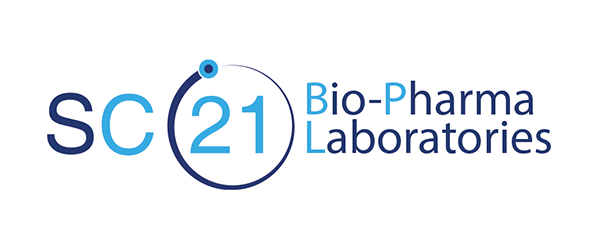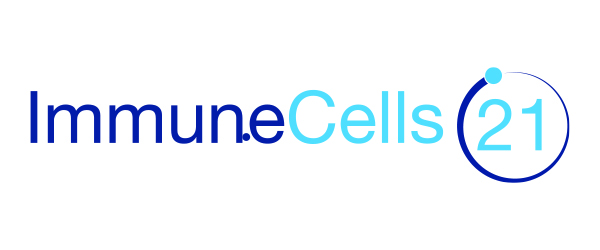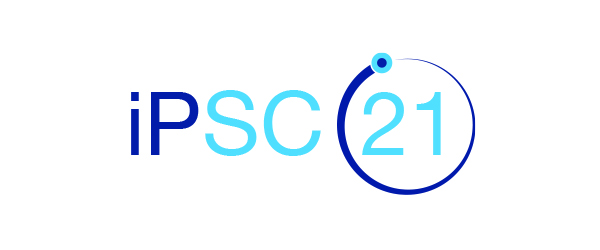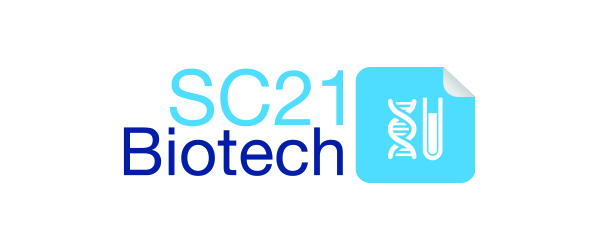Degenerative Disc Stem Cell Treatment
Degenerative Disc Stem Cell Injections: Degenerative disc disease is an age-related condition that happens when one or more of the discs between the vertebrae of the spinal column deteriorates or breaks down, leading to pain.
Stem Cell Therapy for Degenerative Disc Treatment
Despite its name, degenerative disc disease is not a disease, but a natural occurrence that comes with aging.
The rubbery discs between the vertebrae normally allow for flexing and bending of the back, like shock absorbers. In time, they become worn, and they no longer offer as much protection as before.
Disc degeneration may cause no symptoms, or the pain may be so intense that the individual cannot continue with their daily activities.
The condition starts with damage to the spine, but in time, symptoms can affect other parts of the body. Symptoms usually get worse with age.
The discomfort can range from mild to severe and debilitating. It can lead to osteoarthritis, with pain and stiffness in the back.
The most common early symptom is usually pain and weakness in the back that radiates to another area.
Risks of Degenerative Disc Disease:
- Family history of back pain or musculoskeletal disorders
- Excessive strain on the low back caused by sports, frequent heavy lifting, or labor-intensive jobs
- Strain on the lumbar spinal discs due to prolonged sitting and/or poor posture
- Lack of support for the discs due to weak core muscles
- Obesity
- Smoking, or any form of nicotine intakeLifestyle factors that affect overall health can have an impact on the spinal discs
Symptoms of Degenerative Disc Disease:
Common signs include Pain that:
- Is in your lower back, buttocks, or upper thighs
- Comes and goes. It can be nagging or severe, and can last from a few days to a few months.
- Feels worse when you sit, and better when you move and walk
- Feels worse when you bend, lift, or twist
- Gets better when you change positions or lie down
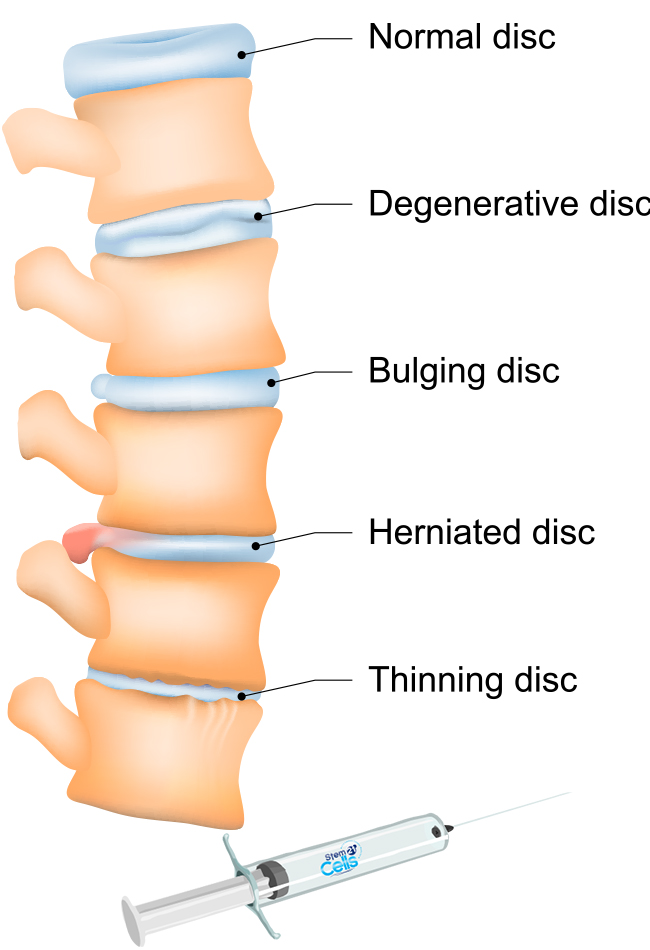
Mesenchymal Stem Cell Treatment Mode of Action and Therapeutic Benefit for Degenerative Disc Treatment
Umbilical cord mesenchymal stem cell (UC-MSC) therapy has shown promise as a potential treatment for degenerative disc disease (DDD). Here are some of the suggested modes of action and therapeutic benefits seen in our degenerative disc stem cell treatments:
Mode of Action:
Anti-inflammatory effects: UC-MSCs have immunomodulatory properties and can suppress inflammation in the degenerated disc. Inflammation plays a role in the progression of DDD and contributes to pain and tissue damage. UC-MSCs can release anti-inflammatory molecules, modulate the immune response, and reduce inflammation in the disc, promoting a more favorable environment for tissue repair.
Regeneration and Tissue Repair: UC-MSCs have the potential to differentiate into various cell types, including disc cells, and promote tissue regeneration. They can secrete growth factors and extracellular matrix components that stimulate the proliferation and differentiation of resident disc cells, leading to the repair and regeneration of damaged disc tissue.
Pain Modulation: DDD often presents with chronic low back pain. UC-MSCs may help alleviate pain through several mechanisms. They can produce analgesic substances, such as endorphins, that can inhibit pain signaling pathways. Additionally, UC-MSCs’ anti-inflammatory effects can reduce pain associated with inflammation in the degenerated disc.
Therapeutic Benefits:
Pain Reduction: UC-MSC therapy has shown potential in reducing pain associated with degenerative disc disease. By reducing inflammation, promoting tissue repair, and modulating pain signaling pathways, UC-MSCs can help alleviate chronic low back pain.
Improvement in Disc Structure: UC-MSC therapy may contribute to the restoration of disc structure and function. Studies have suggested that UC-MSC treatment can enhance disc height, increase disc hydration, and improve the extracellular matrix composition of degenerated discs.
Enhanced Disc Integrity: UC-MSCs’ regenerative and reparative properties can contribute to the improvement of disc integrity. This may include the restoration of disc cellularity, improvement in disc biomechanics, and prevention of further disc degeneration.
Functional Improvement and Quality of Life: UC-MSC therapy has the potential to improve functional outcomes and enhance the quality of life for individuals with degenerative disc disease. This can involve improved mobility, reduced disability, and increased participation in daily activities.
Beneficial Actions of Stem Cell Injections for Degenerative Disc
- Reduce inflammation (anti-inflammatory)
- Transform into bone (osteogenic) and cartilage (chondrogenic)
- Migrate to sites of injury (chemotaxis)
- Communicate with and alter nearby cells (paracrine effect)
- Encourage existing cells to self-repair (autocrine effect)
- Regulating the immune system (immunomodulation)
Results Achieved with Stem Cell Treatment:
Stem cells have the ability to grow into various tissues, cells or even cartilages, and can help manage the symptoms of Degenerative Disc Disease. Stem cells are administered into the body using injections; once the stem cells are in the tissue their objective is to fight off inflammation, to reduce pain, and to regenerate affected tissues.
- Pain and stiffness reduction
- Improved flexibility.
- Improved mobility
- Cartilage regrowth
- Muscular strengthening
- Reduced inflammation levels
- Reduced medication requirement
We organize our stem cell packages based on the size and complexity of your condition. Small, simple conditions require relatively few stem cells to treat them. Large, complicated conditions— or conditions you wish to treat as quickly and as completely as possible—will require larger volumes of stem cells to get the job done.
Our price for this treatment starts at $19.500 (US Dollar). The treatment duration is between 3-5 days depending on your specific condition.
Details | Treatment Type | Stem Cell Volume |
I | Single Area of Focus & Treatment | 50,000,000 stem cells |
II | Multiple Areas of Focus, Simple Inflammatory Conditions, or Early Stage Disease | 100,000,000 stem cells |
III | Complex Conditions or Premium Option for Simple Conditions | 200,000,000 stem cells |
IV | Advanced Stage Disease or Fastest Possible Treatment for All Conditions | 300,000,000+ stem cells |
We select your supportive therapies based on your condition. Your supportive therapies will direct your stem cells to the impacted tissue that needs to be regenerated, trigger selective cell activity, and provide your body with additional biological building blocks to deliver a faster and more complete regeneration.
We offer many supportive therapies, that include but are not limited to:
- Peptides & Messenger RNA
- Laser Blood Irradiation
- Laser Tissue Radiation
- Shockwave Therapy
- Ozone or Oxygenation
- NAD+
- Physiotherapy
- Nutrition & Enzymes
We curate an additional set of simple supportive therapies that you will bring home with you after your treatment, and self-administer for one to three months. This take home set ensures that your stem cells and your impacted tissue continue to receive direction and building blocks to continue to regenerate after your initial treatment.
We typically provide a one to three-month supply of:
- Compounded Nutrition
- Messenger RNA
- Growth Factors

